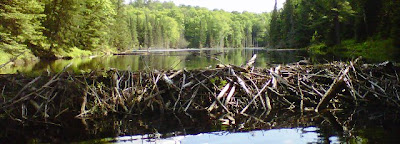Water, water everywhere . . .
You can’t turn on the news without learning about flooding problems somewhere. Huge amounts of damage and heartaches in Quebec, Manitoba, Saskatchewan and the United States.
Central Ontario has dodged the damaging flooding, but some days it seems like the region is about sink into the morasses created by this year’s rains.
| Dead Doe in Ditch Along Highway 35 |
What rains, asks Environment Canada? It says that rainfall in the Muskoka region of Ontario was slightly below average in May and is well below average for June. To most of us, the spring was unusually wet and cold but the weather service says it has been a bit drier and warmer than average.
The difference between the EC facts and our perceptions probably is in number of cloudy days this year. There have not been many heavy downpours, but there have been many days of cloud and light precipitation.
The cloud and dampness have been perfect for flies. The Muskoka-Haliburton mosquito plague this year is the worst in recent memory, especially on the dank, cloudy days.
| Wild Strawberries Just Out |
The flies are driving the four-legged animals crazy. Deer, moose and bears are being chased onto the highways where they hope to catch a breeze and some respite from the flies. Police are reporting a noticeable increase in vehicle-animal strikes this month. Ontario has more than 14,000 vehicle-deer strikes every year.
The wetness, however, has been a joy to plant life. Wild blueberries and blackberry bushes are thriving. Wild strawberries are ready for picking and are bigger and juicier than most years.




